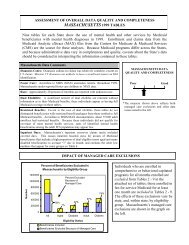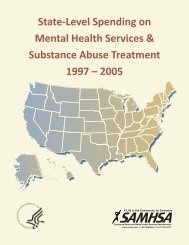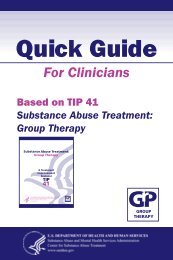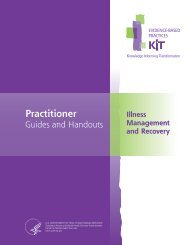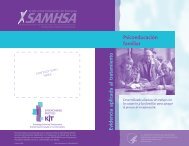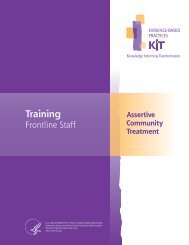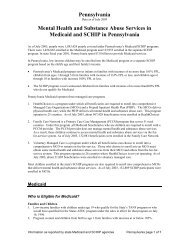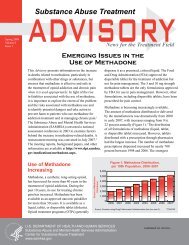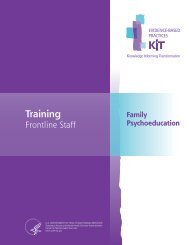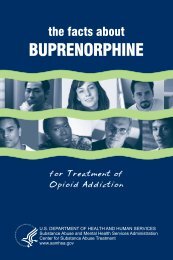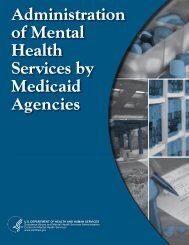Practice Guidelines: Core Elements for Responding to Mental Health
Practice Guidelines: Core Elements for Responding to Mental Health
Practice Guidelines: Core Elements for Responding to Mental Health
Create successful ePaper yourself
Turn your PDF publications into a flip-book with our unique Google optimized e-Paper software.
<strong>Practice</strong> <strong>Guidelines</strong>: <strong>Core</strong> <strong>Elements</strong> <strong>for</strong> <strong>Responding</strong> <strong>to</strong> <strong>Mental</strong> <strong>Health</strong> Crises<br />
Mobile outreach services, which have the capacity <strong>to</strong> evaluate and intervene<br />
within the individual’s natural environment, have inherent advantages over<br />
facility-based crisis intervention, especially when an individual who has personal<br />
experience with mental illness and mental health crises is a part of the intervention<br />
team. Such mobile outreach capacity is even more meaningful when it is not<br />
restricted <strong>to</strong> a special crisis team, but rather when staff and peers familiar with the<br />
individual have the ability <strong>to</strong> literally meet the individual where he or she is.When<br />
intervention within an individual’s normal living environment is not feasible,<br />
hospitalization is not the inevitable alternative; <strong>for</strong> many individuals facing civil<br />
commitment, consumer-managed crisis residential programs can represent a viable,<br />
more normalized alternative that produces good outcomes. 16<br />
national resource<br />
center on Psychiatric<br />
Advance directives<br />
Psychiatric advance<br />
directives (PADs) are<br />
relatively new legal<br />
instruments that may<br />
be used <strong>to</strong> document<br />
a competent person’s<br />
specific instructions or<br />
preferences regarding<br />
future mental health<br />
treatment, in preparation<br />
<strong>for</strong> the possibility that<br />
the person may lose<br />
capacity <strong>to</strong> give or<br />
withhold in<strong>for</strong>med<br />
consent <strong>to</strong> treatment<br />
during acute episodes<br />
of psychiatric illness.<br />
Almost all states permit<br />
some <strong>for</strong>m of legal<br />
advance directive (AD)<br />
<strong>for</strong> healthcare, which<br />
can be used <strong>to</strong> direct<br />
at least some <strong>for</strong>ms of<br />
psychiatric treatment.<br />
In the past decade, 25<br />
states have adopted<br />
specific PAD statutes.<br />
http://www.nrc-pad.org<br />
t<br />
10. helping the individual <strong>to</strong> regain a sense of control is a priority. Regaining<br />
a sense of control over thoughts, feelings and events that seem <strong>to</strong> be spinning<br />
out of control may be paramount <strong>for</strong> an individual in mental health crisis. Staff<br />
interventions that occur without opportunities <strong>for</strong> the individual <strong>to</strong> understand<br />
what is happening and <strong>to</strong> make choices among options (including the choice <strong>to</strong><br />
defer <strong>to</strong> staff) may rein<strong>for</strong>ce feelings that control is being further wrested away.The<br />
individual’s resistance <strong>to</strong> this may be inaccurately regarded as additional evidence<br />
of his or her incapacity <strong>to</strong> understand the crisis situation. Incorporating personal<br />
choice in a crisis response requires not only appropriate training, but also a setting<br />
with the flexibility <strong>to</strong> allow the exercise of options. In<strong>for</strong>med decision-making in<br />
this context is not a matter of simply apprising the individual of the empirically<br />
derived risks and benefits associated with various interventions; it also includes<br />
an understanding among staff that an ostensibly sub-optimal intervention that is<br />
of the individual’s choosing may rein<strong>for</strong>ce personal responsibility, capability and<br />
engagement and can ultimately produce better outcomes.The specific choices<br />
<strong>to</strong> be considered are not limited <strong>to</strong> the use of medications, but also include the<br />
individual’s preferences <strong>for</strong> what other approaches are <strong>to</strong> be used where crisis<br />
assistance takes place, involving whom and with what specific goals.While the<br />
urgency of a situation may limit the options available, such limitations may also<br />
highlight how earlier interventions failed <strong>to</strong> expand opportunities <strong>to</strong> exercise<br />
personal control. Post-crisis recovery plans or advance directives developed<br />
by the individual with assistance from crisis experts are important vehicles <strong>for</strong><br />
operationalizing this principle.<br />
11. services are congruent with the culture, gender, race, age, sexual<br />
orientation, health literacy and communication needs of the individual<br />
being served. Given the importance of understanding how an individual is<br />
experiencing a crisis and engaging that individual in the resolution process,<br />
being able <strong>to</strong> effectively connect with the individual is crucial.A host of variables<br />
reflecting the person’s identity and means of communicating can impede<br />
meaningful engagement at a time when there may be some urgency. Establishing<br />
congruence requires more than linguistic proficiency or staff training in cultural<br />
sensitivity; it may require that <strong>to</strong> the extent feasible, an individual be af<strong>for</strong>ded a<br />
choice among staff providing crisis services.<br />
10



